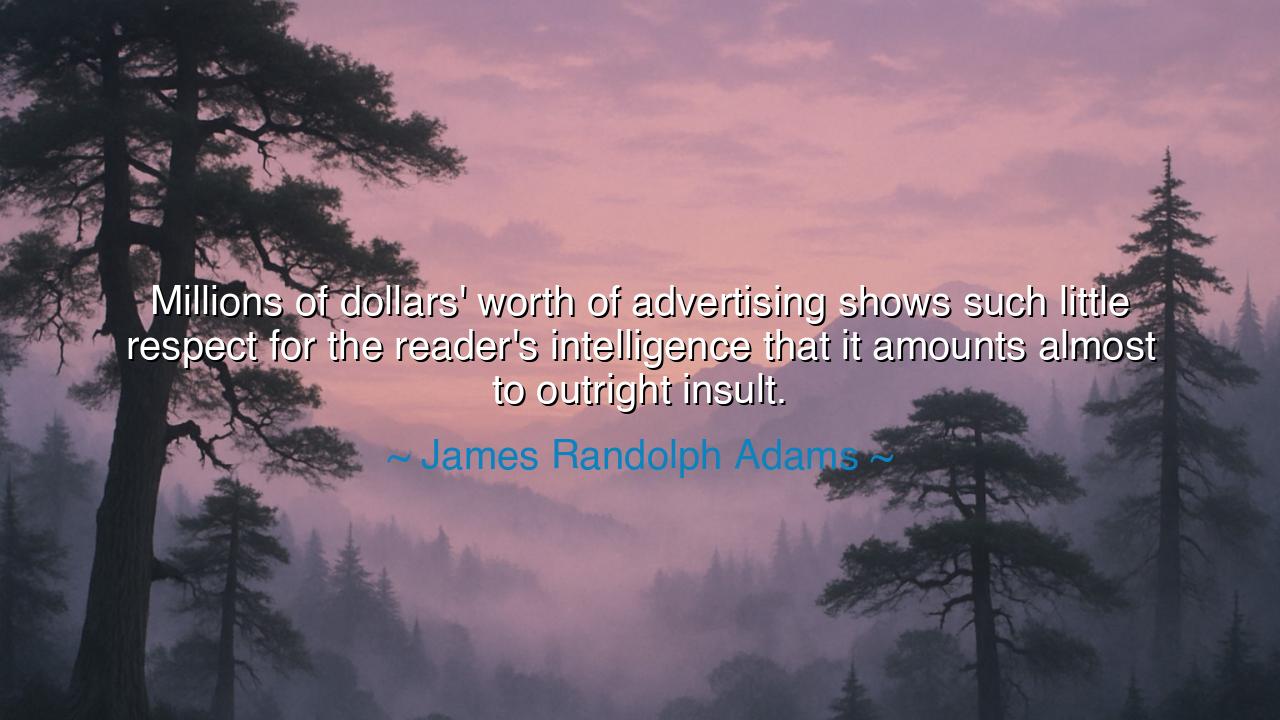
Millions of dollars' worth of advertising shows such little
Millions of dollars' worth of advertising shows such little respect for the reader's intelligence that it amounts almost to outright insult.






Here is a timeless, ancient-style reflection on James Randolph Adams’s quote:
The Insult of Ignorant Persuasion
When James Randolph Adams declared, “Millions of dollars’ worth of advertising shows such little respect for the reader’s intelligence that it amounts almost to outright insult,” he did not speak merely as a critic of commerce, but as a defender of the dignity of thought. His words strike like a bell across the ages, warning that when persuasion abandons respect, it becomes manipulation; and when communication treats the mind as a tool rather than a partner, the soul of truth begins to die. His insight is a call to remember that intellect, like freedom, must be honored — not exploited.
The meaning of Adams’s words lies in his recognition that modern persuasion — whether in speech, writing, or commerce — often forsakes intelligence for control. Instead of appealing to reason, it appeals to impulse; instead of enlightening, it seeks to deceive. He saw in advertising not only a reflection of business but a mirror of culture — a mirror that showed a people being taught to think less, to feel more, and to buy blindly. When messages flatter ignorance instead of awakening wisdom, the market of ideas becomes a marketplace of illusions.
The origin of this wisdom arises from Adams’s own life as a man of advertising and public communication in the mid-twentieth century — an age when the power of media was rising like a new sun over the modern world. He witnessed firsthand how this immense influence, which could have been used to educate and inspire, was often squandered on shallow promises and false glitter. His frustration was not with commerce itself, but with its betrayal of human respect. He believed that words have a sacred duty — to speak to the mind as well as the senses — and when they fail this duty, they degrade both the speaker and the listener.
History, too, echoes this warning. In the ancient city of Rome, orators once ruled hearts through eloquence and truth. Yet as corruption spread, rhetoric became a weapon of flattery and deceit. The Senate, once a place of noble persuasion, descended into a theater of manipulation. The people, drunk on spectacle, ceased to think — and thus became easy to rule. So it has ever been: when communication loses integrity, civilization loses its clarity. What Adams saw in the age of advertising, Rome saw in its age of empire — the seduction of the mind through the abandonment of respect.
To insult intelligence, as Adams wrote, is no small sin. It is to assume that others are unworthy of reason, that they can be led by distraction rather than dialogue. Such arrogance corrodes society from within, for a people treated as fools will either become fools or rise in resentment. The wise communicator, therefore, must speak not to the lowest instincts of humankind but to the highest. To sell, persuade, or teach with honesty is to honor both giver and receiver — to build trust instead of dependence.
There is beauty in honesty, even in persuasion. The philosopher Socrates once said that he could teach only by asking questions, because truth must awaken within, not be imposed from without. Adams’s lament for his age is thus a lesson for ours: that we must never allow our voices — whether in art, business, or politics — to descend into manipulation. The true power of speech lies not in making others obey, but in helping them understand.
Therefore, O listener, take heed of this wisdom: respect the intelligence of others as you would have yours respected. When you speak, write, or persuade, do not appeal to ignorance — appeal to reason, to conscience, to wonder. Resist the temptation of the easy lie or the dazzling exaggeration. The human mind is a sacred temple; every false word spoken within it is an act of desecration.
Let your words, then, be worthy of the listener’s mind. Speak truth even when it is not profitable; craft beauty even when it is not convenient. For the legacy of humanity will not be written by those who sold the most, but by those who spoke with honor. And when you hear the noise of empty persuasion around you, remember Adams’s warning — that to think for oneself is the highest act of rebellion, and to speak with respect is the highest form of power.






AAdministratorAdministrator
Welcome, honored guests. Please leave a comment, we will respond soon